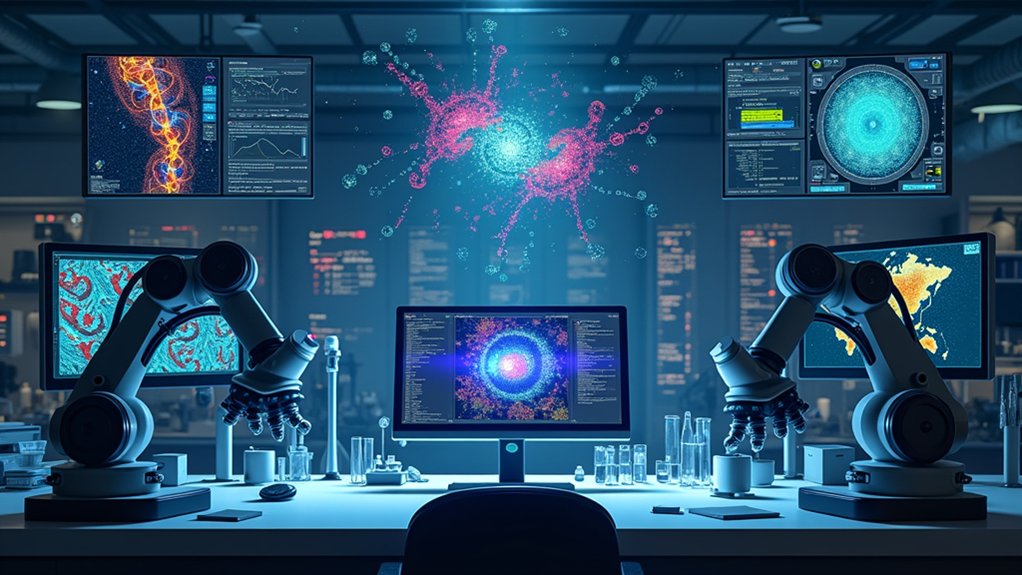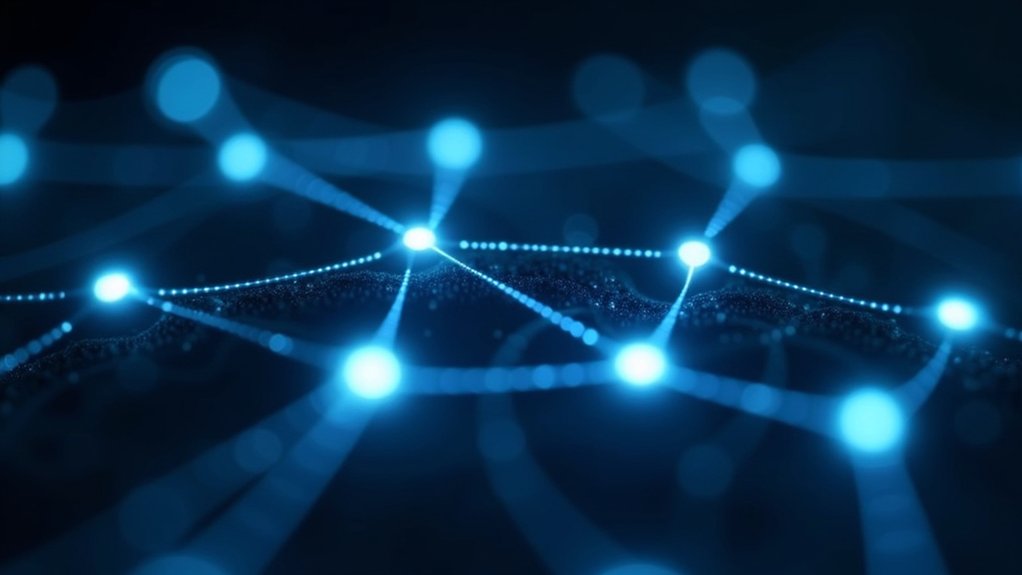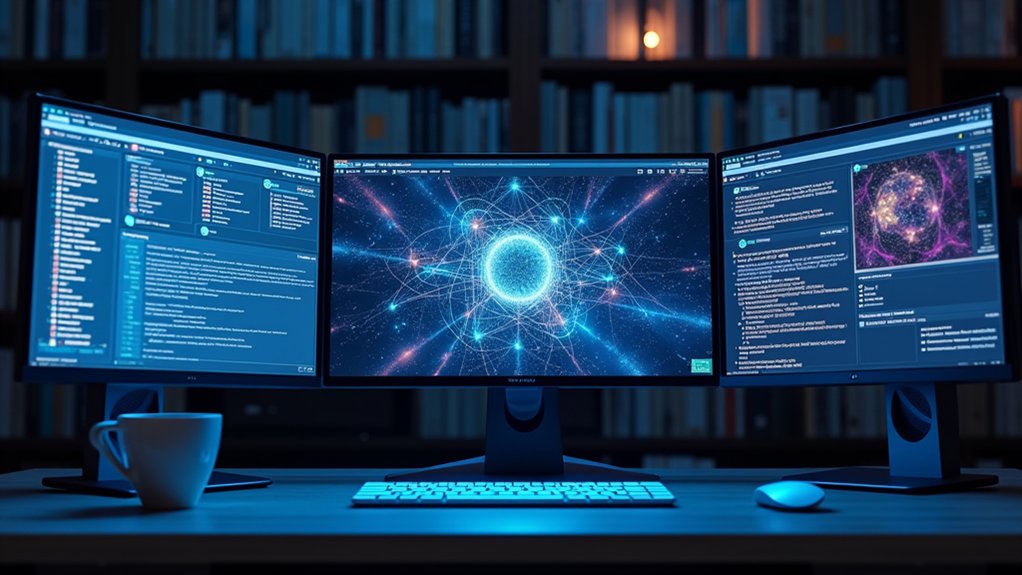Artificial intelligence is transforming scientific research across multiple fields. AI systems analyze massive datasets faster than humans, identifying patterns that might otherwise go unnoticed. Smart equipment like AI-enhanced microscopes and autonomous lab robots are accelerating discoveries. While challenges exist, including the "black box" problem and data bias concerns, the future looks promising. Scientists anticipate AI will soon help generate and test hypotheses, potentially leading to breakthroughs that current methods can't achieve.

As scientists around the world tackle increasingly complex problems, artificial intelligence (AI) is becoming an essential tool in their research toolkit. AI systems can analyze data much faster than humans and find patterns that might otherwise go unnoticed. They're especially valuable when dealing with massive datasets that would take people years to examine.
Scientists use AI across many fields. In biology, AI helps discover new drugs and predict how proteins fold. Weather forecasters use it to model climate changes and predict storms. At the Large Hadron Collider, physicists rely on AI to analyze particle collision data. Astronomers use it to find exoplanets and classify celestial objects.
From astronomy to particle physics, AI is revolutionizing scientific discovery across every discipline.
Different types of machine learning power these scientific advances. Deep learning helps process images from telescopes and microscopes. Reinforcement learning optimizes experimental settings. Natural language processing sifts through millions of scientific papers to find connections between studies.
Modern scientific equipment now comes with built-in AI. Smart microscopes can identify cell structures automatically. AI-enhanced mass spectrometers identify chemicals more accurately. Robotic systems run lab experiments without human supervision. These tools work around the clock, speeding up the pace of discovery. This integration has revolutionized drug discovery processes which traditionally exceeded a decade in duration.
Despite its benefits, implementing AI in science isn't without challenges. Scientists worry about the "black box" problem—when AI makes decisions they can't explain. Data bias can lead to flawed conclusions. Managing huge datasets for AI training remains difficult.
AI is changing how science progresses. It suggests new hypotheses, tests them rapidly, and finds connections humans might miss. Virtual experiments can save time and resources before moving to physical testing. AI also helps reduce research bias by providing more objective analysis of experimental results. Similar to healthcare applications, AI enhances diagnostic capabilities through advanced imaging analysis that can detect patterns invisible to the human eye.
The future looks promising for AI in science. Quantum computing may solve currently impossible problems. New AI systems will better explain their reasoning. Scientists and AI will likely form stronger partnerships, with humans asking questions and AI helping find answers.
This collaboration across institutions and disciplines may lead to breakthroughs we can't yet imagine.
Frequently Asked Questions
Will AI Replace Human Scientists Completely?
AI won't completely replace human scientists.
While AI excels at analyzing data and identifying patterns, it lacks human creativity, intuition, and abstract reasoning.
Experts believe the future lies in collaboration, with AI handling routine tasks while humans focus on innovative thinking and experimental design.
Human qualities like curiosity, interdisciplinary collaboration, and the ability to ask groundbreaking questions remain irreplaceable in scientific discovery.
How Secure Is Scientific Data Processed by AI Systems?
Scientific data processed by AI systems faces several security challenges. Data breaches, privacy concerns, and vulnerability to attacks remain significant risks.
Scientists are addressing these issues through encryption, differential privacy, and federated learning techniques. Regulatory frameworks like GDPR provide some protection, but implementation varies globally.
Regular security audits and strict access controls are becoming standard practice. Data governance policies continue to evolve as AI becomes more integrated into scientific research.
Can AI Help Solve Climate Change Problems?
AI's helping fight climate change in several ways.
It improves climate models for better predictions about weather and sea levels.
AI optimizes power grids to use more renewable energy efficiently.
For the environment, it tracks deforestation and monitors wildlife using satellite images.
In farming, AI reduces waste through precision agriculture.
These tools give scientists and policy makers better data to make informed decisions about climate issues.
Are There Ethical Boundaries for AI in Scientific Research?
Ethical boundaries for AI in scientific research do exist.
Experts worldwide have developed guidelines to prevent bias, protect privacy, and guarantee transparency. Organizations like UNESCO and the EU have created frameworks that researchers must follow.
AI systems need regular audits for fairness, and scientists should always disclose when they've used AI.
Human oversight remains essential, as responsibility for AI-generated results can be difficult to determine.
How Is AI Addressing Diversity Issues in Scientific Studies?
AI is tackling diversity problems in scientific research through several approaches.
Tools like PhyloFrame account for ancestral diversity in genetic studies. AI can identify biases in research funding and help underrepresented researchers develop proposals.
Diverse AI development teams create more balanced algorithms. Machine learning models analyze data from varied populations, making research more inclusive.
These tools guarantee scientific findings apply across different demographic groups.









